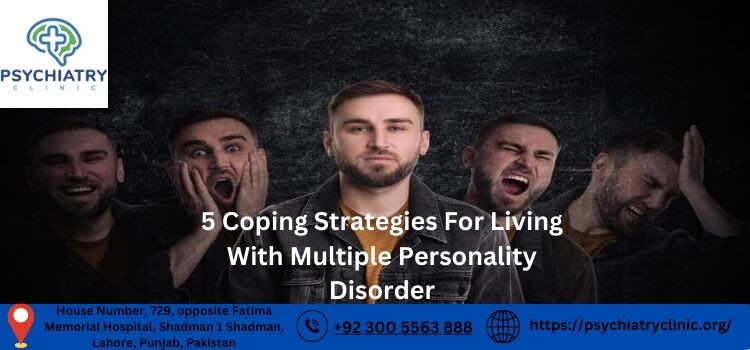5 Coping Strategies For Living With Multiple Personality Disorder. Comprehensive Guide
Living with multiple personality disorder (MPD), also known as dissociative identity disorder (DID), can be challenging and overwhelming. As an individual living with this condition, you may experience a range of symptoms such as memory lapses, sudden shifts in mood and behavior, and difficulties maintaining relationships. While there is no cure for MPD/DID, there are coping strategies that can help you manage the symptoms and live a fulfilling life.
In this article, we will discuss five coping strategies for living with multiple personality disorder.
Let’s dive in to get more details.
5 Coping Strategies For Living With Multiple Personality Disorder

Many people ask what the 5 Coping Strategies For Living With Multiple Personality Disorder Living with multiple personality disorder. (MPD), also known as dissociative identity disorder (DID), can be challenging and overwhelming. As an individual living with this condition, you may experience a range of symptoms such as memory lapses, sudden shifts in mood and behavior, and difficulties maintaining relationships. Moreover, you may also struggle with feelings of isolation and stigma due to the misconceptions surrounding this disorder. However, some strategies can help you cope with these challenges and lead a fulfilling life.
Seek Professional Help
The first step in managing MPD/DID is to seek professional help from a therapist who specializes in working with individuals with dissociative disorders. A therapist can provide you with a safe and non-judgmental space to talk about your experiences and help you understand your condition better. They can also teach you specific coping skills, such as grounding techniques and mindfulness, to manage symptoms like dissociation and memory lapses.
Educate Yourself
Another essential coping strategy for living with MPD/DID is to educate yourself about the disorder. Many misconceptions surround MPD/DID, and learning more about the condition can help you better understand yourself and your experiences. Moreover, educating yourself can also help combat the stigma surrounding this disorder and empower you to advocate for yourself.
Practice Self-Care
Living with multiple personalities can be emotionally and mentally draining. Therefore, it is crucial to prioritize self-care in your daily routine. This can include activities such as exercising, getting enough sleep, and practicing relaxation techniques like deep breathing or meditation. Taking care of your physical and mental well-being can help you manage stress and improve your overall quality of life.
Build a Support Network
Having a support network of understanding and empathetic individuals can be incredibly beneficial for managing MPD/DID. This can include family members, friends, or support groups for individuals with dissociative disorders. Connecting with others who can relate to your experiences can provide you with a sense of validation and reduce feelings of isolation.
Develop Coping Strategies
Lastly, it is essential to develop coping strategies that work for you. This could include ways to manage symptoms like memory lapses, mood shifts, or difficult emotions. For example, keeping a journal or creating a daily routine can help you stay organized and manage your different personalities. It is also crucial to communicate clearly with others about your needs and boundaries.
Living with MPD/DID may present numerous challenges, but it is possible to lead a fulfilling life with the right coping strategies and support. Remember that seeking professional help and educating yourself about the disorder is crucial. Additionally, practicing self-care, building a support network, and developing coping strategies tailored to your needs can greatly improve your overall well-being.
Facts About Multiple Personality Disorder
- MPD/DID is a mental health condition characterized by the presence of two or more distinct personalities within one individual.
- It is estimated that 1.5% of adults in the general population have DID, with higher rates among individuals who have experienced significant trauma in childhood.
- The exact cause of MPD/DID is still unknown, but it is believed to be a result of severe and ongoing trauma, particularly in childhood.
Symptoms Of Multiple Personality Disorder
Symptoms Of Multiple Personality Disorder are given below:
- Memory lapses or gaps in recall of events, personal information, or everyday activities.
- Sudden shifts in mood and behavior.
- Feeling detached from one’s body or emotions.
- Recurrent nightmares or flashbacks related to past traumatic experiences.
- Difficulty maintaining relationships due to changes in personality and behaviors.
- Confusion about identity, personal values, and beliefs.
Treatment Options
Some of the treatment options are given below:
- There is no cure for MPD/DID, but treatment can help manage symptoms and improve overall functioning.
- Treatment often includes therapy, medication, and support groups.
- Therapies such as cognitive-behavioral therapy (CBT) and dialectical behavior therapy (DBT) are effective in managing the symptoms of MPD/DID.
- Medications can be prescribed to target specific symptoms, such as anxiety or depression.
- Support groups provide a safe and understanding space for individuals with MPD/DID to connect with others and share their experiences.
Remember that everyone’s experience with MPD/DID is unique, and it may take time to find the right treatment plan that works for you. Don’t be afraid to reach out for help and know that with proper support and coping strategies, it is possible to live a fulfilling life with multiple personalities.
Conclusion
The question arises what are the 5 Coping Strategies For Living With Multiple Personality Disorder Living with multiple personality disorder? Living with multiple personality disorder can be challenging, but it is essential to remember that you are not alone. Seek professional help, educate yourself about the disorder, and prioritize self-care in your daily routine.
Don’t be afraid to reach out for help and know that you are worthy of love, understanding, and compassion. So, always keep fighting and never give up hope. Remember to take things one day at a time and celebrate even the smallest victories.
FAQs
Frequently asked questions by people.
How to deal with someone with multiple personality disorder?
The best way to deal with someone with multiple personality disorder is to educate yourself about the condition, be understanding and empathetic, and communicate clearly and openly. It is also important to respect their boundaries and support them in seeking professional help.
How do you live with multiple personalities?
Living with multiple personalities can be challenging, but it is possible to lead a fulfilling life with the right coping strategies and support. Some tips include practicing self-care, building a support network, and developing coping strategies tailored to your needs.
What are the therapy techniques for DID?
Some therapy techniques that are effective in managing DID include cognitive-behavioral therapy (CBT), dialectical behavior therapy (DBT), and eye movement desensitization and reprocessing (EMDR).

